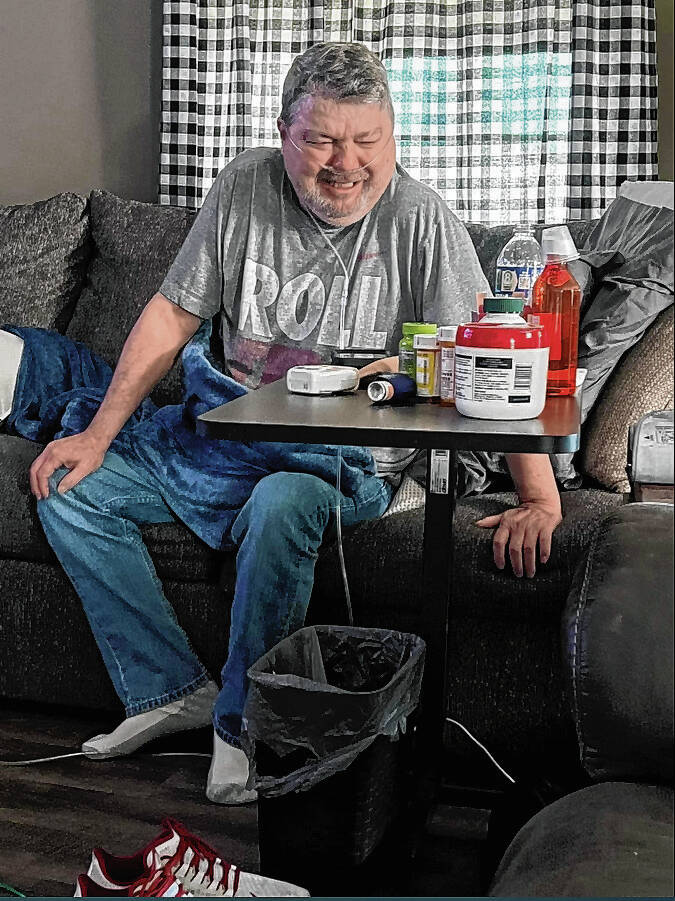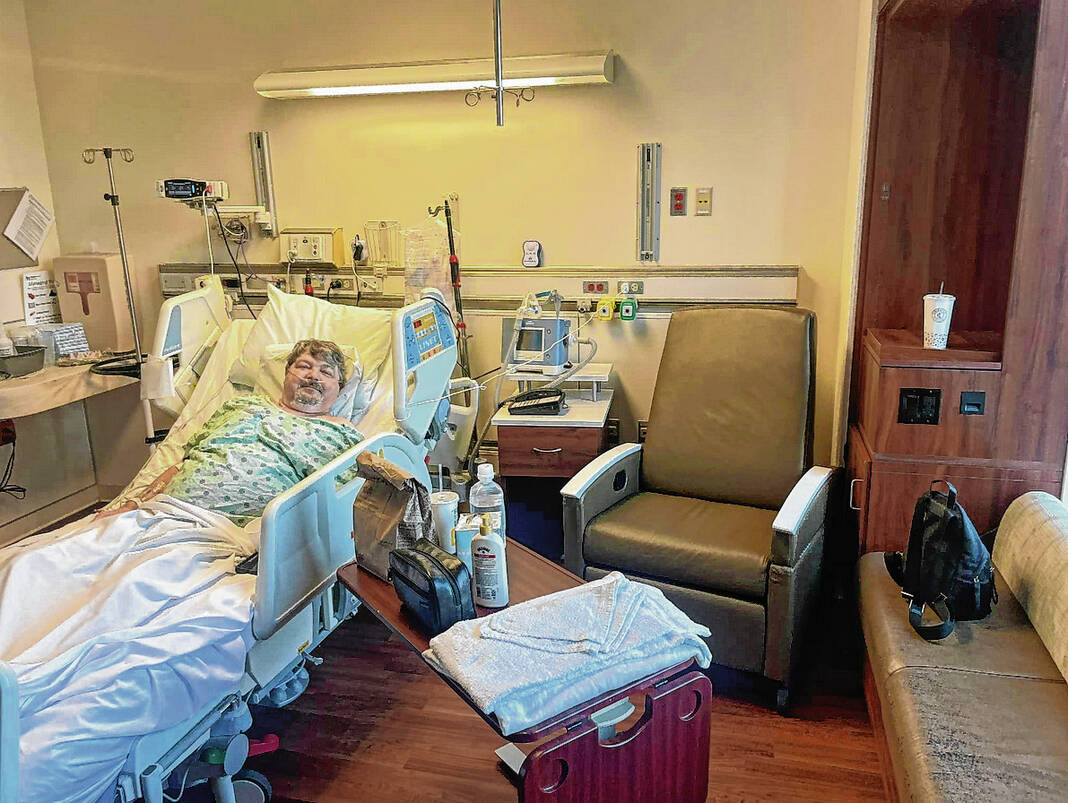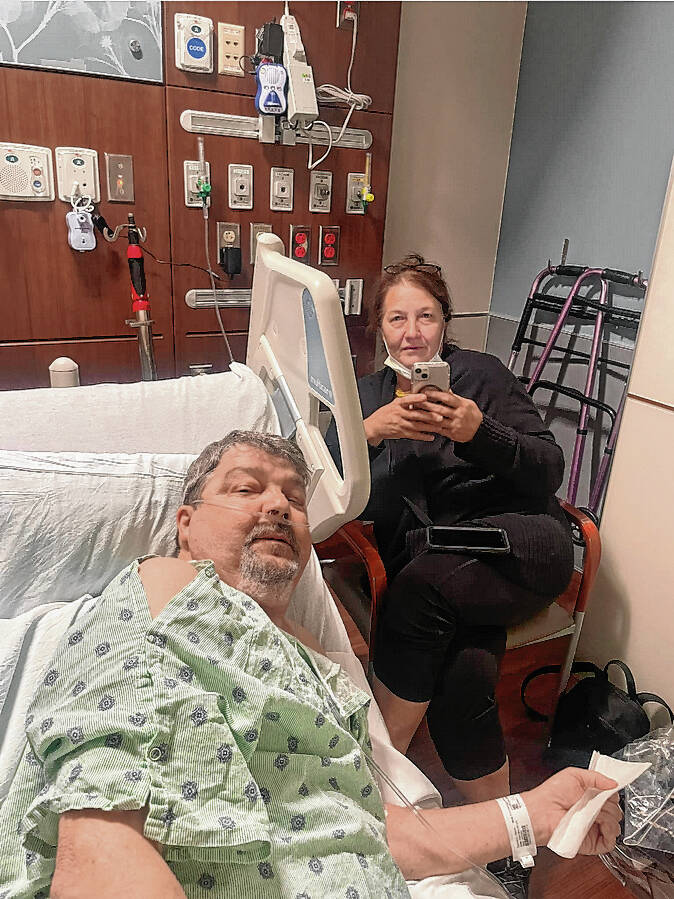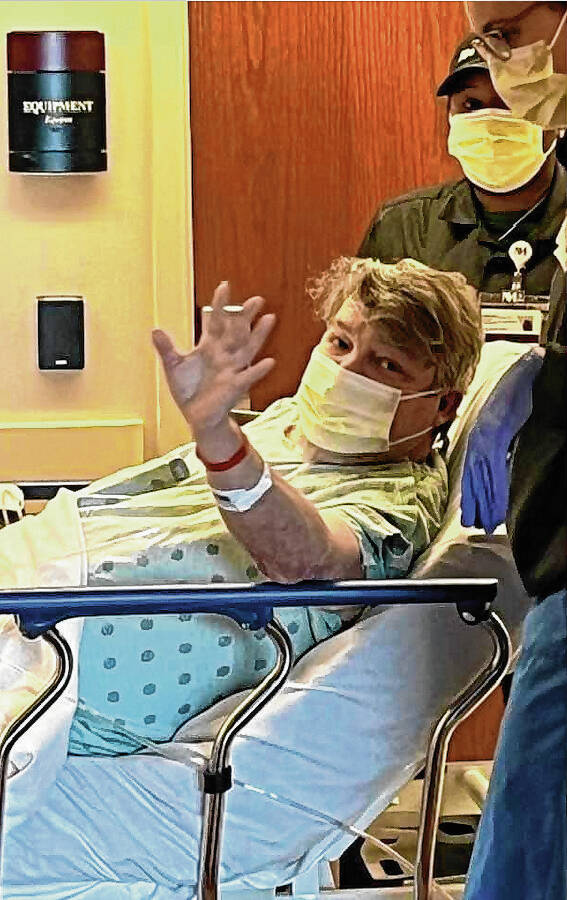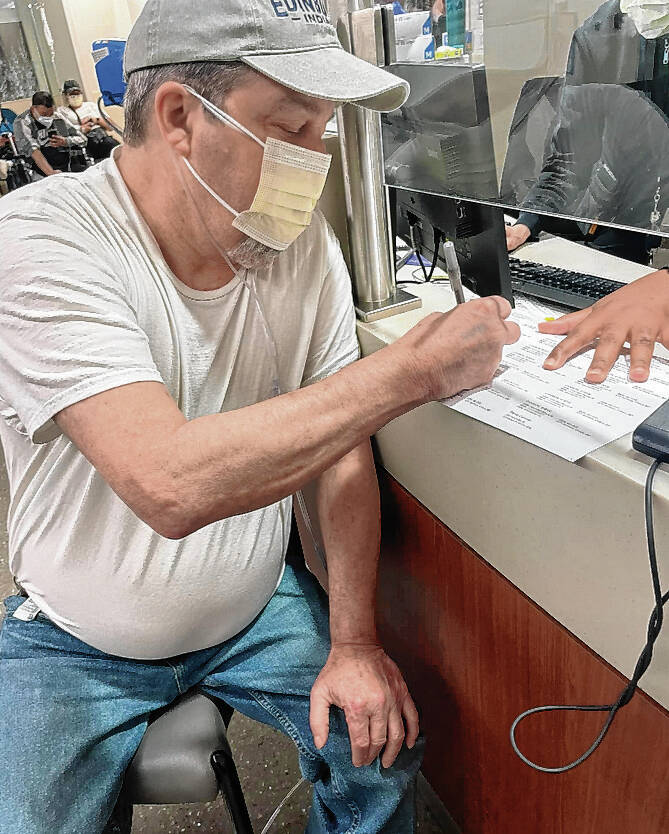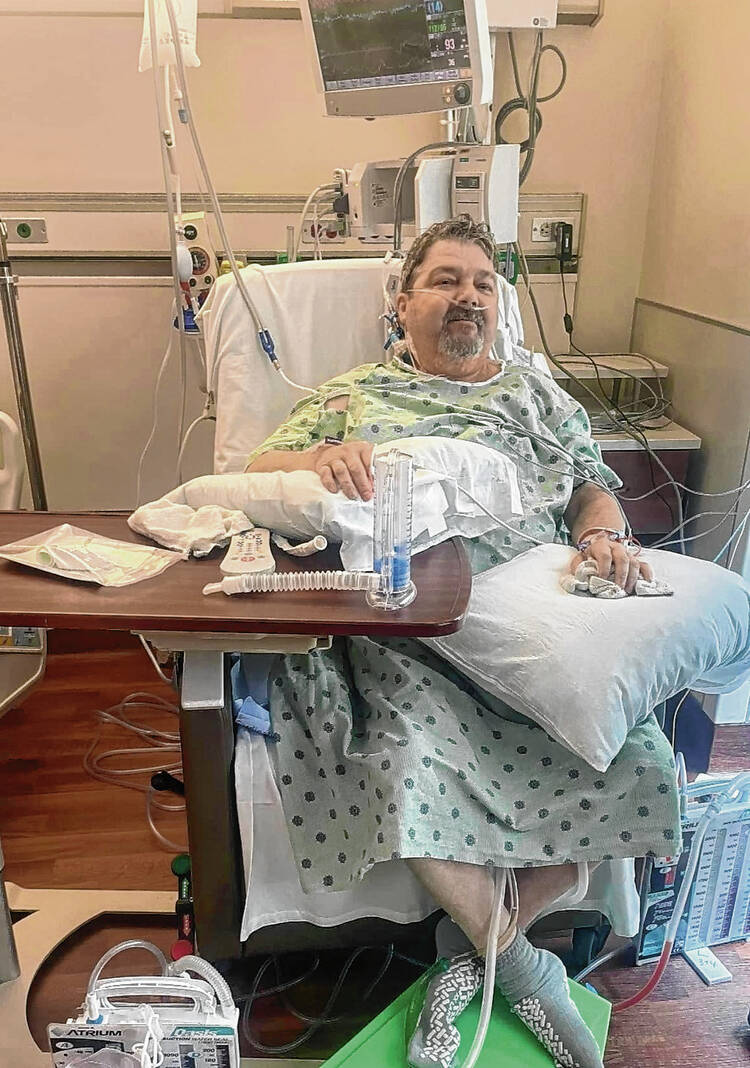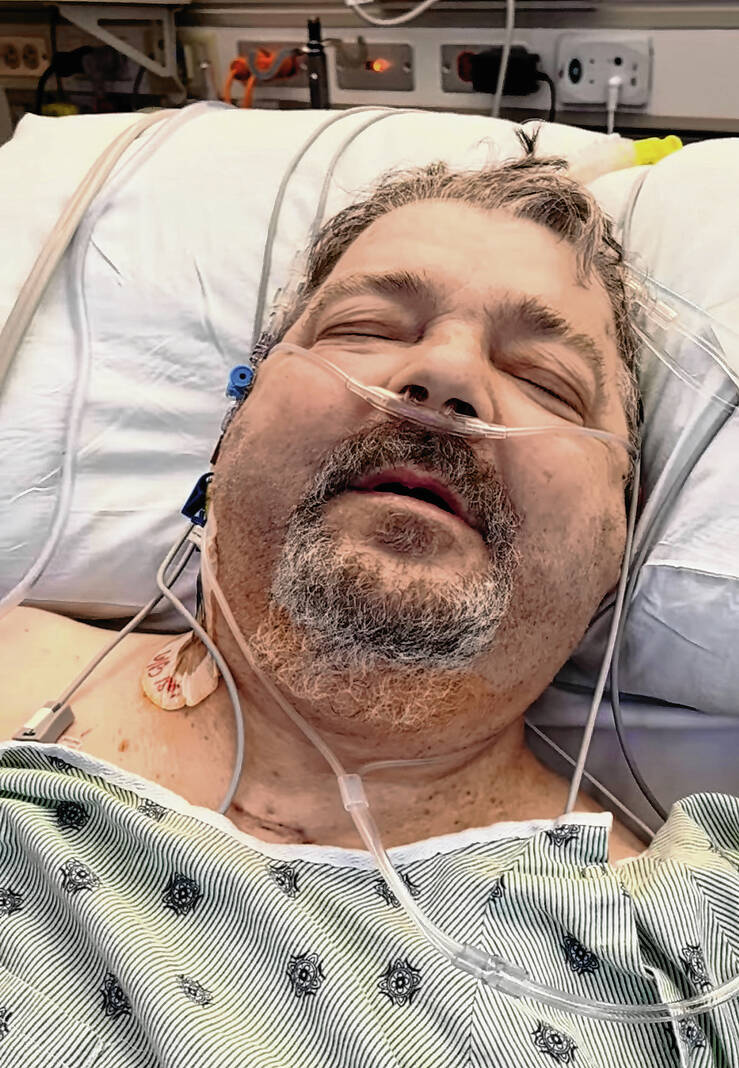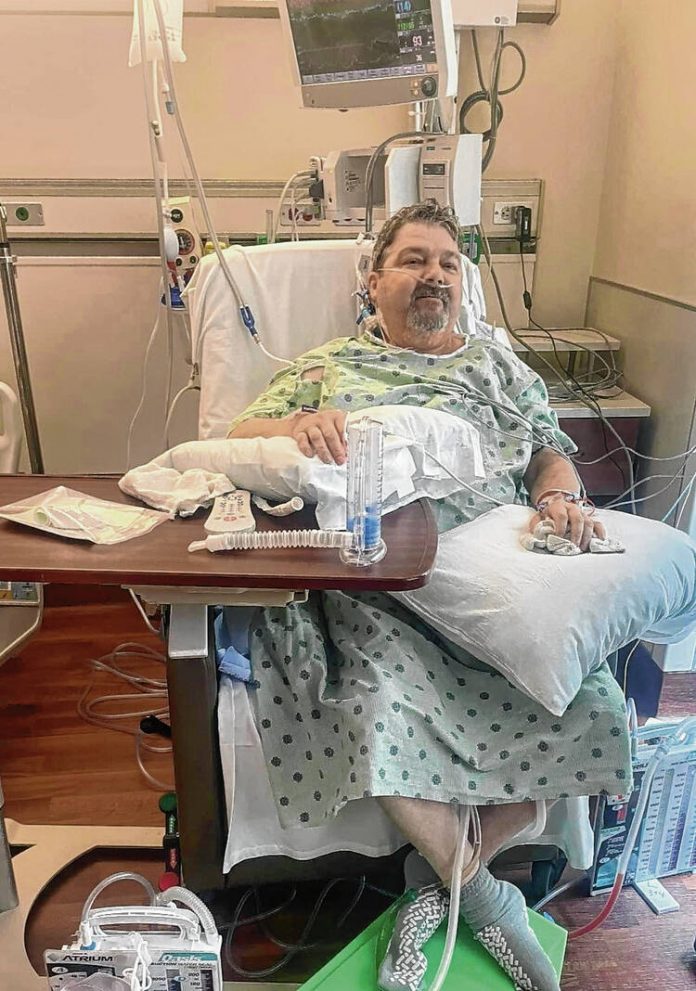
Steve Cannon, an Edinburgh resident, recovers in Northwestern Medicine in Chicago on Wednesday following a double-lung transplant. Cannon received a cutting edge transplant designed for people with lung cancer in need of a transplant, becoming only the fourth person to receive the treatment.
SUBMITTED PHOTO
Hope was all but gone.
Steve Cannon was out of options. The Edinburgh resident has suffered from emphysema and chronic obstructive pulmonary disease for nearly 15 years, increasingly struggling to breathe as the diseases ravaged his lungs. While waiting on a lung transplant list, he developed lung cancer.
His doctors had given up, recommending he enter hospice care and for his family to prepare for his death.
Then, a miracle happened.
“One of the nurses told us that he was a ticking time-bomb,” said Ashley Cannon, Steve’s daughter. “We sat in a funeral home thinking we had less than a month. Now today, he’s had a double lung transplant.”
A cutting-edge cancer treatment worked for Steve Cannon, and on Monday night, the family received word that a double lung donor match had been located. The 60-year-old went through the complicated surgery at Northwestern Medicine after being rushed to Chicago, Illinois, and as of Thursday, is recovering well, Ashley Cannon said.
After coming so close to losing her father, she sees a light of optimism for him moving forward.
“My dad is a fighter. He has not stopped, he has not given up, and he’s here to stay,” she said.
One phone call threw the entire Cannon family into chaos.
When were informed by transplant officials that a pair of lungs matching Steve Cannon had been found, they quickly mobilized for the trek to Chicago. They had limited time to make it to the hospital, and needed to leave right away.
Because of the delicate nature of the lungs, transplant officials contacted multiple people who could potentially be a match at the same time. If the first person on the list didn’t match the organs, Steve Cannon would be next.
Piling into the car with whatever they could grab, they received help getting out of Edinburgh quickly. The Edinburgh Police Department provided an escort to Interstate 65, helping speed up their trip.
For the family, it was yet another fortuitous turn that had defined the past months.
“It’s like everything has been a sign that we needed to do this,” Ashley Cannon said. “Everything fell into place.”
Steve Cannon had been dealing with lung issues for years. He was diagnosed with both emphysema and chronic obstructive pulmonary disease — issues that had plagued his mother as well. His condition grew worse and worse, to the point where his lungs deteriorated enough to warrant a transplant.
They had started the transplant process at Indiana University Health, going through days of testing, family counseling and more in order to qualify.
Steve Cannon was deemed healthy enough for a transplant, but as he was preparing to sign the paperwork and officially get on the list, the COVID-19 pandemic shut everything down.
“All appointments were canceled unless they were life-threatening,” Ashley Cannon said. “So my dad couldn’t go in to sign the paperwork. When they reopened it in June for appointments, they found cancer in his right lung.”
Indiana regulations stipulate that if anyone trying to get an organ transplant is diagnosed with cancer, they have to be cancer-free for five years before even returning to the list. The setback was a blow to the Cannon family, even as Steve Cannon started radiation to treat the cancer.
The treatment seemed to be successful, and his doctors said the cancer was in remission. But a lung setback landed him in the hospital, where he was told cancer had been found in both lungs. His doctor recommended immunotherapy, which seemed to work for his cancer, but inflamed his chronic obstructive pulmonary disease.
“It got to the point where they was nothing to bring him back,” Ashley Cannon said. “He had a bad reaction, it broke his entire body out, we were in the hospital for weeks.”
Without any other options, doctors told the family to prepare for Steve Cannon’s death. They had his son return from Iraq to see him before he died, and advised them to start hospice care.
One day, Steve Cannon and the whole family went to the funeral home to prepare for his funeral.
“My dad just started to give up hope,” Ashley Cannon said. “We were sitting there in the funeral home looking at caskets, that was morbid.”
With options running out, the family found a spark. Cannon’s cousin had seen a news story about an innovative clinical program showing results at Northwestern Medicine in Chicago.
The program was aimed at patients with Stage 4 cancer that was encased in the lungs and had not spread to other parts of the body. Dr. Ankit Bharat, chief of thoracic surgery at Northwestern Medicine Canning Thoracic Institute, and others had developed an approach similar to patients whose lungs had been destroyed by COVID-19.
Patients are put on a full heart and lung bypass, then surgeons delicately take out both cancer-ridden lungs at the same time, along with some lymph nodes, according to a Northwestern Medicine news release. They wash the airways and chest cavity to clear the cancer before putting the transplanted lungs in.
“These patients can have billions of cancer cells in the lungs, so we must be extremely meticulous to not let a single cell spill into the patient’s chest cavity or blood stream. We believe this technique can help reduce the risk of recurrence, which we learned through our experience with pioneering COVID-19 lung transplants,” Bharat said in the news release.
Ashley Cannon reached out to Bharat’s office to inquire about her father becoming a patient. She was told to get a referral from his oncologist, and they’d consider it. His oncologist agreed to a referral, and in early March, Steve Cannon was accepted to the program. He would be one of the first, after the initial successful double transplant on a lung cancer patient was completed in March.
Even after the first appointment in Chicago, Steve Cannon’s condition improved. He had been confined to a hospital bed for two months, unable to walk. Even sitting still, he needed 3 liters of oxygen just to breathe.
But at Northwestern Medicine, doctors reworked his vitamins, diet and iron supplements. By the time the Cannons left after eight days, he needed only .5 liters when sitting, Ashley Cannon said.
“He was walking a mile a day. He hadn’t been able to do that in years,” she said.
Steve Cannon’s health was improving, but he still needed a lung transplant. The call came on Monday. When they made their way to Chicago, they learned that he would be receiving the transplant he needed.
The joyous news was tempered by the reality of the situation, Ashley Cannon said.
“It’s so sad to be so excited about something like this, when you think about what had to happen to get here,” she said. “It’s bittersweet. I wish I could see the family and tell them I’m so sorry.”
Still, the Cannons are moving forward. The transplant appears to be a success, and Steve Cannon is progressing better than doctors anticipated, Ashley Cannon said. On Wednesday, he was awake and able to sit up.
Steve Cannon will remain in Chicago for the next three months as doctors monitor him and help him adjust to his new life as an organ transplant recipient.
The family realizes they have a long road ahead of them. But nothing can dampen the fact that Steve Cannon has been given another chance at life.
“They said his body did so well with it, his was one of the quickest transplants they’ve done,” she said. “He’s been doing really good.”


